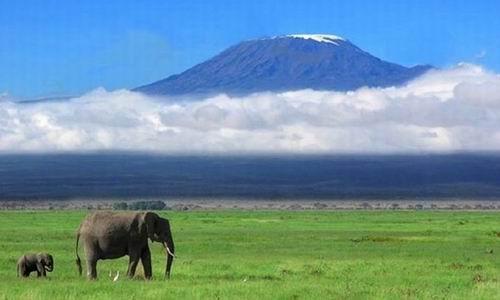
|
Climbers scaling Mount Kilimanjaro are taking unnecessary risks with their health, experts have warned. Travel firms have seen an increase in bookings following the successful summit by nine celebrities for last year's Comic Relief campaign. But Edinburgh University scientists warned many climbing Africa's tallest peak "know little or nothing" about high altitude, which can be fatal. Scientists camped out to test altitude sickness in more than 200 climbers. The researchers camped for three weeks on the mountain at a height of 4,730m - not far below the 5,895m summit. They assessed climbers using the Lake Louise consensus scoring system, which records symptoms such as headache, sickness and fatigue. The academics found almost half, or 47%, of those who had climbed Kilimanjaro, were suffering from altitude sickness before they reached the summit and most were ascending too high, too quickly. Signs of sickness include vomiting, headaches, difficulty sleeping and sometimes problems with co-ordination. Effects can be felt from as low as 2,500m above sea level and 75% of people will have mild symptoms at 3,000m or higher, the study said. Reserachers said the best way to acclimatise was to climb slowly and some trekkers incorporate acclimatisation rest days. Some also opt for anti-sickness drugs, although there is controversy in the mountaineering community about whether they are effective. However, the experts found that neither altitude-sickness drugs nor rest days had a major effect on whether people got ill. They concluded that climbers were going up so rapidly, the drugs could not protect against the harmful effects of altitude. It also did not matter which route people took, suggesting "the rate of ascent on any itinerary is sufficiently fast to cause acute mountain sickness in a large proportion of climbers". However, climbers who had managed to acclimatise beforehand on nearby high mountains were less likely to suffer from sickness, the research said. Risk dying Stewart Jackson, who conducted the study, published in the journal High Altitude Medicine and Biology, said: "We found that many climbers knew little or nothing about altitude sickness and did not have previous experience of being at high altitude. "This research emphasises the need to increase awareness of the risks of altitude sickness and the importance of taking your time to acclimatise. "Undertaking an acclimatisation trek before attempting to summit Mount Kilimanjaro offers climbers the best chance of a safe, successful summit." Severe altitude sickness can lead to serious complications, including shortness of breath at rest, inability to walk, decreasing mental alertness and a build up of fluid on the lungs which can result in a "gurgling" sound when breathing. People with these symptoms must descend the mountain quickly or risk dying. High altitude cerebral oedema and high altitude pulmonary oedema are rare, but deadly. In both cases, the lack of oxygen results in leakage of fluid into either the lungs or the brain.
|
据英国广播公司报道,一些专家曾警告称,乞力马扎罗山的登山者们对自己的健康承担着不必要的风险。 旅游公司发现,自去年九位名人主持的欢喜救济会(Comic Relief)成功落幕之后,今年乞力马扎罗山登山项目预订量迅速增加。 但爱丁堡大学(Edinburgh University)科学家警告称,许多攀登非洲最高峰的登山者对海拔“所知甚少或一无所知”,这是致命的危险。 许多科学家露营在外,为200多名登山者测试高原反应。 这些研究人员在山上海拔4730米——距5895米的顶峰不远之处露营了三周。 他们通过路易斯湖共识评分系统(Lake Louise consensus scoring system,高原病诊断标准)对登山者进行评估,记录一些高原病症状,如头痛、恶心和乏力。 学者发现,近一半或47%的乞力马扎罗山登山者,在登顶之前会出现高原反应,其中大多数都登的过高或过快。 高原病症状包括呕吐、头痛、失眠,此外,有时伴有协调问题。 研究人员表示,上述症状最低在海拔2500米处就可有所察觉,75%的人在海拔3000米或更高处会有轻微高原病症状。 研究人员称,最好的适应办法是慢慢爬,有些徒步旅行者会休息数日以适应海拔环境。 还有些人选择使用抗高原病药物,尽管其效果在登山界中饱受争议。 但专家们发现,无论是高原反应药物还是休息数日,都不是影响人们是否感到不适的主要因素。 他们得出结论称,登山者攀登速度过快,药物无法预防海拔高度带来的有害影响。 他们还表示,登山路线的选择也是无关紧要的,“无论走哪条路线,大多数登山者都会因攀登速度过快引起急性高原病”。 然而,研究人员称,若登山者事先在附近的高山曾设法适应海拔环境,那么引发高原病的可能性较小。 死亡的风险 该项研究负责人斯图尔特•杰克逊(Stewart Jackson),将研究结果发表在《高原医学及生物学》杂志上,称:“我们发现,许多登山者对高原病所知甚少,并且之前也没有过高海拔的经验。 “该研究主要在强调增强高原病风险意识的需要和放宽时间适应海拔的重要性。” “在登顶前事先进行徒步适应准备,对乞力马扎罗山登山者安全、成功登顶来说是最可靠的保障。” 剧烈的高原反应会导致严重的并发症,包括呼吸短促、无法行走、思维反应速度下降以及肺部体液积聚引起呼吸时“呼呼”的声音。 出现这些症状者必须马上下山,否则或面临死亡的风险。 高原脑水肿和高原肺水肿都是非常罕见但却致命的疾病。两种疾病都是因缺氧导致液体渗漏进入肺部或大脑。 (译者 落叶林117 编辑 Julie) 扫一扫,关注微博微信
 
|
